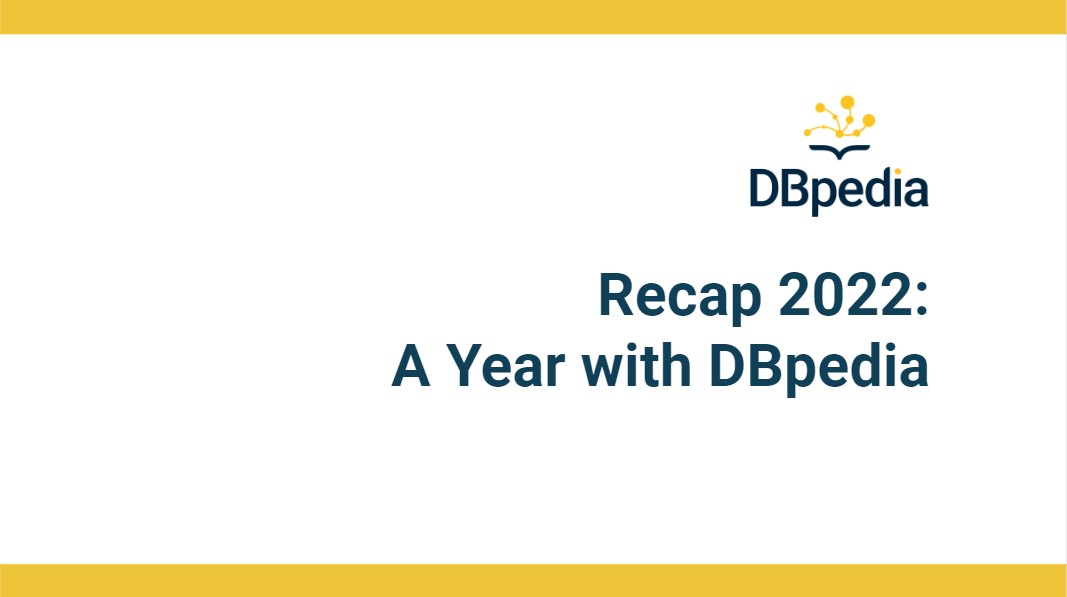A year with DBpedia – Retrospective Part 1
Can you believe it..?
… fifteen years ago the first DBpedia dataset was released. Fourteen years of development, improvements and growth. Now more than 4,150 GByte of data is hosted on the DBpedia Databus. We want to take this as an opportunity to send out a big “Thank you!” to all contributors, developers, members, hosters, funders, believers and DBpedia enthusiasts who made that possible. Thank you for your support!
In the upcoming blog series, we will take you on a retrospective tour through 2022, giving you insights into a year with DBpedia. In the following we will also highlight our past events.
DBpedia Snapshot Release
Historically, this release has been associated with many names: “DBpedia Core”, “EN DBpedia”, and – most confusingly – just “DBpedia”. In fact, it is a combination of EN Wikipedia data, 62 million community-contributed cross-references and owl:sameAs links and Community-contributed extensions. In 2022 we released the 2021-12 release, 2022-03 release and 2022-09 release. In July 2022, we encountered several new issues, but the major problem was that the current version of DBpedias Abstract Extractor was no longer working. As a result, we could not extract any version of English abstracts for April, May, and June 2022. We decided not to publish the snapshot 2022-06 release. Please check more details on our website.
DBpedia Tutorial @ The Web Conference 2022
On April 25, 2022, DBpedia organized an Online Tutorial at this year’s The Web Conference. The main topic of this tutorial was the DBpedia community project which is centered around the DBpedia Knowledge Graph, the DBpedia Infrastructure and the DBpedia Services. The tutorial also contained a session dedicated on the DBpedia’s current motto, i.e. Global and Unified Access to Linked Data. In practical examples we illustrated the potential and the benefit of using DBpedia in the context of the Web of Data. Get more information and a deeper insight on the blogpost.
DBpedia Tutorial 2.0 @ Knowledge Graph Conference 2022
On Tuesday the 2nd of May, DBpedia organized the second edition of the DBpedia tutorial at the Knowledge Graph Conference (KGC) 2022. This year Johannes Frey made his way to New York and gave the tutorial on site.
Milan Dojchinovski and Jan Forberg joined online. The ultimate goal of the tutorial was to teach the participants all relevant technology around DBpedia, the knowledge graph, the infrastructure and possible use cases. If you missed our presentations, please check our blogpost.
Google Summer of Code
For the 11th year in a row, we have been able to support and guide young, ambitious developers who joined us as an open source organization to work on a programming project over this summer. Each year we have been inspired by new project ideas, many amazing students, and mostly great project results that have shaped the future of DBpedia. If you want to have deeper insights in our GSoC contributors work you can find their blogs and repos on the DBpedia blog.
Data Week Leipzig 2022
On July 4th, 2022 the first Data Week Leipzig started. Data Week was a week-long event in Leipzig focusing on digitization in heterogeneous areas of life as well as transparent, traceable and sustainable applications. Among many other presentations and formats in the area of digitalization and AI, DBpedia also made a great contribution to the event. DBpedia had some presentations and the LSWT on July 5th and organized the first ever DBpedia PhD Symposium. In case you missed the event, our presentations are available on the DBpeda event page. For further insights check out our blogpost.
In the upcoming blog post after the holidays we will give you more insights in the past events and technical achievements. We are now looking forward to the year 2023. We plan to have meetings at the Data Week 2023 and the SEMANTiCS 2023 conference. Both conferences will take place in Leipzig, Germany.
We wish you a merry Christmas and a happy new year. In the meantime, stay tuned and check our Twitter, Instagram or LinkedIn channels. You can subscribe to our Newsletter for the latest news and information around DBpedia.
Julia & Emma,
on behalf of the DBpedia Association
- Did you consider this information as helpful?
- Yep!Not quite ...

